The Language of the High Holidays
Like everything else, the High Holidays are shaping up differently this year. I’m not spending hours debating whether to cook brisket or chicken (and then making both) or thinking about how many carb-heavy dishes I can squeeze into break-fast. Instead, I’m preparing streamlined meals for two: my husband and myself. I haven’t given any thought to what I’m wearing to synagogue, because, well, I’m going to be sitting on our couch. We are going to services, or rather, services will be coming to us via streaming. Instead of sharing tickets with my children, I’m sending them links to click. One thing remains the same, though: how strongly I feel my parents’ presence this time of year when I pull out my mother’s holiday recipes, when I unpack the heirloom silverware from its velvet-lined wooden box and set the table, when I light the yahrzheit candles, when I say Yizkor. But what really brings my parents to the forefront of my mind is the immersion in Hebrew—my parents’ language.
Growing up in Chicago in the 50s, I didn’t know anyone else whose parents’ native language wasn’t English. My parents were both born in Israel. My mother spoke Hebrew. My father, born abroad to an American father, was born in Mea She’arim, the Ultra-Orthodox section of Jerusalem. Hebrew, viewed as a sacred language, was reserved for prayer and religious study. His family spoke Yiddish in daily life.
I was the youngest of three by more than a decade. By the time I made my appearance (after my parents’ 21st anniversary), my parents wanted to protect their children from the stigma of speaking a foreign language. Their fears were not unfounded: after a long stay in Israel visiting family, my then seven-year-old brother returned to Chicago calling our mother Ema, earning the mockery of the neighborhood kids. We now know that learning a second language as a child is beneficial to cognitive development, but it would be years before that research would come out, and so my parents resolved to speak only English at home. What an act of will it must have taken to communicate with each other in their adopted language.
Just as Hebrew had been special for my father’s family, the language became reserved for times when my parents did not want their kids to understand. That worked pretty well with my brother and sister, but I had a facility for languages and quickly picked up enough Hebrew to piece together some of my parents’ secrets. At that point, Mom and Dad reached back to their childhood and switched to speaking—rapidly—a schoolyard version of Hebrew in which a “b” is placed before every syllable except the first. For example, Anee yalda tova becomes Abonniebee Ybaldaba tbovaba. I could pick up a random lebo or kehben, but it was no longer enough to understand what they were saying.
Of course, my parents’ accents signaled to everyone that they were from somewhere else and opened the door to comments ranging from merely curious to downright rude and ignorant. People sometimes treat non-native English speakers as if they are less educated or less intelligent. People often guessed where my mother had been born (Greece? Italy?), but I didn’t fully realize she had an accent until I was ten. My mother’s voice, so familiar and loved, was just her. And I don’t think I ever really discerned my father’s accent.
Although I eventually became aware of their occasional linguistic missteps and mix-ups, (which made for some comical and confusing moments), some of the phrases I heard—and used—growing up went unquestioned and became part of my vernacular.
In Hebrew, the same verb, soger, indicates shutting a door as well as turning off electronic equipment. So in my home, it was common to hear close the lights or close the television. To this day, I have to make an effort not to use close that way. In Hebrew, the same word, regel, refers to one’s foot or leg. A conversation with my mom when I once pulled a muscle in my foot resembled a Who’s on First? comedy routine.
My most vivid memory of the nuances of English took place when I was about to embark on a yearlong study abroad program in France. My parents accompanied me to New York to see me off—my group was traveling by ship.
My mother crossed the ocean by ship between Israel and America several times and offered me advice. Some of it was good—avoid going past the galley if you’re queasy. Some turned out to be not applicable—wear that dress when the Captain invites you to sit at his table (not that kind of trip). She also supplied me with Dramamine to help with possible seasickness.
On board, my parents and I became separated (I hadn’t yet learned the wisdom of staying in place rather than wandering when someone is looking for you) and by the time we reunited, we only had time for a quick hug before all parents were directed off the ship.
As my parents stood in the midst of the well-wishers crowding the dock, waving and shouting Bon Voyage, my mother was feeling the weight of sending her teenage daughter so far away (This was 1969 and none of our high tech methods of communication existed). Feeling it was her last chance to pass along any forgotten bit of advice, my mother called, “Belinda! Belinda! Remember…Remember to take the pill!” (Again, this was 1969; the pill only meant one thing—that is, to everyone other than my mom, who was talking about Dramamine.) Other parents took up the chant and within seconds, a couple hundred people were shouting “Belinda, remember to take the pill!” My father took my mom’s hand, and they made a quiet, but hasty, exit. As for me, my worries about not knowing anyone on board proved needless—my mother’s goodbye boosted my profile, and I was quite popular.
I’m brought back to the present moment by the arrival of an email from my Rabbi. It contains that all-important link that will connect us to our community, as well as a reminder that the Holy Days are a time for introspection. I turn my focus onto myself: What kind of daughter was I?
I realize that I haven’t always been appreciative of how growing up in a multilingual home has enriched my life. As an adolescent, I could be impatient and self-conscious about my parents’ language slip-ups. I should have focused more on what they were saying, rather than how they were saying it. As a young adult, I felt my parents should have made more of an effort to turn their children into full-fledged bilinguals, failing to consider the pressure to assimilate at that time. As I matured, my perspective broadened.
As these memories bubble up, I recognize that my experience has informed my interests and values. I’ve always been fascinated by words and stories, by language and languages; in fact, every job I’ve held as an adult has centered on communication: writer, teacher, actor.
Like anyone, I’m sometimes curious when I hear people speak in accented English, but I certainly don’t judge them or assume I know anything about their hearts and minds. I like to think that my understanding of what defines a person and my tolerance for differences extend to other parts of my life, as well—traits that are often tested in today’s political climate.
I finish setting my holiday table for two with challah, pomegranates, and my favorite: sliced apples and honey on a special dish. In my mind, I hear my parents chanting the blessing for a sweet year, and I long to hear the voices of my Israeli family. I plan a Zoom call to wish them all L’Shana Tova u’Metuka.
During this time, many people are searching for the things that feel like home and family. For me, that will always be the sounds and rhythms of Hebrew—my parents’ language.

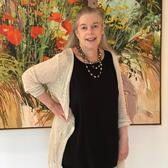
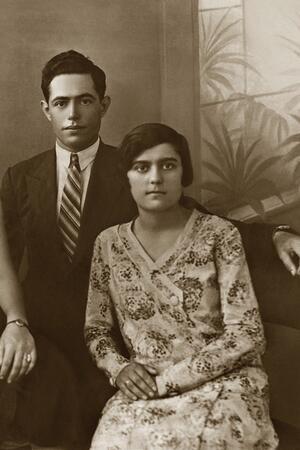
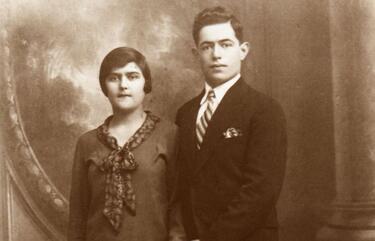
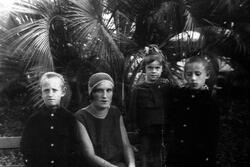
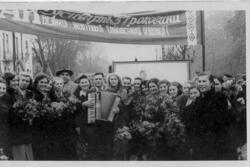



Such a wonderful story,full of sweet and loving thoughts and feelings...so beautifully expressed. Thank you for sharing!
Thanks, Jilanne. Yes, I’ve always felt that. Wishing you a sweet and meaningful year.
Beautiful essay, Belinda! Language connects us in so many ways. Happy New Year!
Lovely ans sweet. L'shanah Tovah!
In reply to Lovely ans sweet. L'shanah… by Mark Cohen
Thanks, Mark! And the same to you!
What a sweet article! Brought back memories of my parents speaking Yiddish when they didn’t want me to understand. Thanks for sharing a bit of your childhood. Shana Tova to you and your family!
In reply to What a sweet article!… by Suzy Klein Kaufman
Thanks, Suzy! Glad that you could relate to my experiences. L'Shana Tova!
I love this piece. Your sensitivity to others and the world around you is apparent.
I can hear your parents voices reminding you to take the pill on the ship. LOL!!
Beautiful Belinda !!
What great memories you shared....
L’ Shana Tova wishing for a sweet and peaceful year.